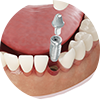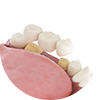Restore your smile with
Evesham Place
Schedule your first visit with experienced implant dentists
Call us: +44 808 812 6606
Highly experienced team to provide the best implant treatment
We provide affordable payment options to our patients
Our mission is to provide the best service possible, every time.

Clinical Director and Implant Dentist
Stephen Anderson
- Stephen qualified from Queen’s University Belfast in 2008. After completing his Vocational Training Stephen spent 2 years working as a Senior House Officer and Speciality Doctor in Oral Surgery. During this time, he obtained his Membership of the Faculty of Dental Surgeons (MFDS) from the Royal College of Surgeons in Edinburgh, winning the John Smith medal for the highest mark in the examination.
- After time in private practice in Australia and Singapore, Stephen worked as a lecturer in the Oral Surgery department in Trinity College, Dublin. During this time, he published several articles in peer-reviewed journals. He then completed a two-year diploma programme in implant dentistry and subsequently gained his Diploma in Implant Dentistry (DipImpDent) from the Royal College of Surgeons in Edinburgh.
- Stephen now limits his practice to dental implants, placing hundreds each year. He accepts referrals for all aspects of implant dentistry, from straight-forward placements to complex bone grafting.

Depending on your teeth' condition during your first visit, you may expect the below services:
 Personalised treatment
Personalised treatment
 Full mouth x-rays
Full mouth x-rays
![]() Full periodontal charting
Full periodontal charting
Measuring the space between a tooth and the gum tissue surrounding it
![]() Intra-oral imaging
Intra-oral imaging
![]() Dental exam
Dental exam
![]() Before photos
Before photos
![]() And any required examination
And any required examination
During your first visit, we will discuss your dental history, conduct a thorough examination and propose a treatment plan. The visit lasts about 45 minutes.
To ensure a smooth experience, we recommend arriving 15 minutes before your scheduled appointment time.
What should I consider as a patient?
Dental implants are a modern way to replace missing teeth. They are designed to be a long-term alternative solution for smile restoration.
 Dental implants |
 Fixed bridges |
 Removable dentures |
No treatment |
||
| Overall Considerations | |||||
| Comfort (More comfortable than removable dentures?) |
|
Yes |
N/A | N/A | |
| Cost (Average Price Range) |
|
Medium |
Moderate |
N/A | |
| Function (Can restore chewing ability?) |
|
Yes |
|
Decreased Function |
|
| Feeling (Sensation in the mouth) |
|
It feels less natural |
Removable, feels less natural |
Decreased sensation |
* Results in this table show average results only and do not necessarily apply to each specific case.
**The comparison chart above has been meticulously crafted through research conducted by numerous dental institutes, research companies, and universities. If you wish to delve deeper into the scientific resources underpinning this information, please click here.

Address;
14 Evesham Place,
Stratford Upon Avon
CV37 6HT
Opening Hours;
Monday 8:30 a.m. – 5:15 p.m.
Tuesday 8:30 a.m. – 7 p.m.
Wednesday 8:30 a.m. – 5:15 p.m.
Thursday 8:30 a.m. – 5:15 p.m.
Friday 8:30 a.m. – 5 p.m.
Saturday Closed
Sunday Closed
Accessibility/Parking;
- We have limited patient parking available at the rear of the practice. Please note that the entrance to the Car Park is narrow so please take care when you manoeuvre through it.
- For longer appointments we recommend the nearby Car Parks: NCP Rother Street (Bell Court Car Park) and Rother Street Civic Car Park
- For shorter appointments there is ample on-street parking available on: Albany Road (Limited to 1 hour) and Shottery Road (Limited to 2 hours)
- Train; We are a 5 minute walk from Stratford Upon Avon train station.
- Taxi; Our reception team will be pleased to arrange a taxi to collect you after your appointment
Take the first steps to your new smile with TeethToday
If you want more information or you are interested in scheduling your first visit, leave your contact details and one of TeethToday's dental implant consultants will reach out to you

TeethToday is a service connecting patients with dental implant professionals across the UK and Ireland to help you to restore a beautiful smile. Our mission is to provide patients with all the necessary information, help them make the right decision and support you through the entire dental implant process. (Please see the risks in the disclaimer)
TeethToday personal dental implant consultants are here to help:
- Assist you throughout the entire implant treatment – our services are free of charge
- Answer your questions related to possible solutions for your missing teeth and the treatment process
- Find a listed clinic close to your location
- Schedule your first visit with experienced dentists specialized in implant treatment
- Please note that the personal dental implant consultant is not a healthcare professional and will not provide medical advice
Request a consultation and schedule a convenient date & time for a callback
Frequently asked questions
Disclaimer 1: Every surgical procedure carries potential risks. You should always consult with a dental professional prior to treatment. Potential risk factors may vary depending on medical or other conditions of each patient. The possibility of immediate placement and the use of a prosthetic tooth depends on many factors, such as bone presence and quality, dental history, implant location, and availability of the final restoration. Your clinician will fully describe the possible scenarios to you during consultation prior to surgery. Consult your clinician to find out if dental implants are right for you.
Disclaimer 2: Please note that if you choose to enter into a treatment relationship with one of the listed clinics this treatment relationship will be solely between you and the respective listed clinic. TeethToday / Straumann explicitly disclaimers and waives any and all responsibility or liability for the treatments provided by the listed clinics.
